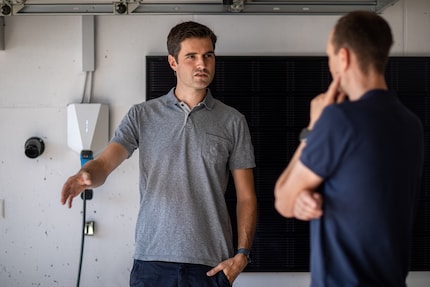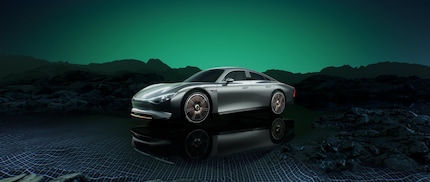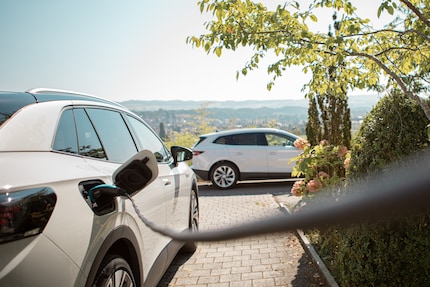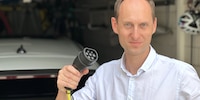
Background information
A different price every 15 minutes: I’m buzzing to try out these new electricity tariffs
by Martin Jungfer

Hans Fischer went electric in 2017, so he has a good grasp of a lot of the current models through extensive test drives. He’s someone who knows about the pros of electromobility, as well as its drawbacks.
I’m new to electric cars. I might travel green, but in the electric world, I’m still a bit wet behind the ears.
The complete opposite to Hans Fischer. He describes himself as an e-mobility enthusiast and, since 2010, he’s become an important fount of knowledge with his technology blog (site in German) on topics ranging from energy management to solar energy and electric cars. Hans is a qualified electrical engineer and family man, and for the last three years he’s been working on an important issue for the future. He’s the founder and co-owner of Solar Manager AG (site in German), which sells control software. Use cases include optimising solar power generated on roofs.
We decided to meet at an apt spot for the interview – at a place where you can already get a taste for the future. Where are we? At the electric charging stations in the Kemptthal motorway services, of course.
Hans, thanks for taking the time out to talk to me. I thought we could meet here because I had to charge my car anyway. But it’s pretty much full.
Hans Fischer: (laughs) Yes, you’ll have overestimated – as most people actually do – how little you need to charge up in reality while you’re out and about. Especially as you’re in the fortunate position of being able to charge at home.
That’s true. I’ve already mentioned that I charge my car battery using electricity from the Solar Manager you invented.
That should mean you always have enough electricity in the summer months for daily trips to the office. Am I right?
Yeah, that’s true as well. But I actually wanted to be the one asking the questions. So, the forecast for the sale of electric cars is very positive at the moment (site in German). Surely it can’t just be hype?
I don’t know of anyone who wants to go back to a traditional engine after buying an electric car. There are a number of strong arguments in its favour – from the driving experience that gives you delay-free acceleration; high efficiency; the quiet ride and, of course, the environmental aspect.
And yet, a lot of people are still sceptical. What are the three main concerns or fears that you hear time and again?
First off, there’s the question of range. Then, there’s the concern that you might not be able to find enough charging stations while you’re out. And thirdly… (pauses for thought)… maybe the question of whether the car battery has a long enough lifespan.
And how would you respond to these concerns? For instance, the issue about range for electric cars?
That it’s unfounded – in the vast majority of cases, at least. For example, I’m someone who travels a lot for work, so I rack up more miles than your average driver. Thanks to large batteries, today’s electric cars can easily travel 300 to 400 km before you need to recharge them.
But that’s not enough to go on holiday.
In Switzerland, you can get almost anywhere with that range. But I know what you’re getting at. When I go to Italy with my family, I schedule my charging stops. It’s worth noting that people with traditional cars also take short breaks. They’ll need to go to the loo, refuel or stop for a snack. And a stop like that easily eats up 15 minutes. In that time, I can be doing all of that while recharging my electric car to give me more range.
But fast charging on the go comes at a price, does it not?
You’re right, but even if I pay say 79 rappen for a kW hour, it’s roughly on a par with petrol or diesel if I convert that to what it would cost for 100 km. And for electric car drivers, fast charging is the exception not the rule anyway. Tallying up my research, I found that, despite doing a lot of driving for work, fast charging barely accounts for 15% of my total. For many, this will be well under ten per cent.
Is that because they charge at home in their garage or carport?
Yes, that’s normally how it works. Here, for instance, the battery charges up overnight at a low electricity tariff, with it only costing me a few francs. Or, even better, free of charge via a solar system on your roof – that is, if you overlook the one-time costs of installing a system like that.

People who rent often have a harder time because they don’t have a charging option.
That is a real problem. It needs to be solved politically, with people in rental flats having a right to a charging station. There are already attempts to get this to happen. (site in German) If you can’t charge at home at the moment, you’re unlikely to make the switch. This is where I see a great opportunity for employers.
In what way?
Companies could offer car charging for their employees. That would make for an appealing fringe benefit.
Some companies even let their customers use charging stations for their electric cars for free. That way, their car charges while they shop.
It’s a good thing, but it won’t be around for long. When more electric cars are on the road, or if an offer like that gets abused, it’ll cause conflict that companies would rather avoid.
While we’re on the topic of hassle: recharging while you’re out and about can still sometimes be an adventure. There are different charging networks that require different charging cards, confusing tariffs, charging stations that don’t work…
It’s different if you’re used to filling up at petrol stations. But if you’re in Switzerland, Austria, Germany, France, the Benelux countries, northern Italy or Scandinavia, the infrastructure is already quite good. To give you an example, I have a Move charging card for Switzerland, a VW WeCharge and one from EnBW, a German energy company. These cards let me charge up anywhere. And if you’re planning for longer distances, there are great apps and websites such as «A Better Route Planner» and «Pump» that know the right charging stations and can calculate the number of stops you need, including charging times at a station.
Am I not right in saying charging stations often aren’t in the nicest looking places?
I was once at a charging station in the middle of an industrial area, next to a builders’ merchant. That’s not the nicest, because all you can do is sit in the car and wait until you can carry on driving. In Switzerland, Astra was advertising 100 fast charging stations on the motorway as of 2018. But laybys aren’t always necessarily where you want to spend time. That being said, they do occasionally offer relatively nice places to have a picnic.
If you’re thinking about buying an electric car at the moment, isn’t it best to wait anyway? After all, the technology keeps on getting better.
If you thought like that, you’d never buy anything. Obviously, electric cars will continue to advance, but they’re still very much suitable for everyday use already. Electrically powered cars with a range of 1000 km, such as the Mercedes EQXX have to achieve low consumption via a design that’s very drop-like. Or cars will keep getting heavier because of the increased battery capacity.

You also keep hearing about revolutionary battery technologies that make charging as fast as present-day refuelling.
News of a «breakthrough» like this often comes from research institutions. It might still be years before these new technologies reach the mass market. And in practice, there are often many smaller leaps forward that come up.
As an electric car driver, will I get software improvements sooner?
Updates are across the board, with all cars benefiting from updates at the same time, whether they’re new or older. These are known as over-the-air updates. Akin to what you get on your smartphone. The hardware is just part of the product and its performance, but the software is also essential. It’s a similar story with electric cars.
Today, there wasn’t a single car charging at any of the six stations in Kemptthal. So it wasn’t difficult to find a space. But will it stay that way as there are more and more electric cars on the road?
We touched on the second part of your question higher up, namely the issue of charging options. Essentially, we have a comparatively high density of charging stations in Switzerland, and it’s always improving. But obviously, no infrastructure can be designed to absorb the most extreme peaks. That would just be too expensive. If half of Switzerland were to head to the mountains during the holidays, there could be waiting times at popular charging points. But that’s really only in very few cases at certain times.

It remains to be seen if the batteries in electric cars work in the long term – or rather, in concrete terms, if they still have the same range a few years into use.
We don’t yet know what capacity batteries will have after ten or 15 years. Electric cars haven’t been on the market for that long. However, initial reports show that battery wear is likely to be a much smaller problem than expected. One Tesla driver has already done a million kilometres. (site in German).
That’s not likely to win over petrol heads…
It’s difficult to get through to some people with rational arguments. They see cars with traditional engines as almost like a kind of religion. They have to roar when you put your foot on the pedal.
For garage owners, I guess the electric car isn’t exactly a blessing.
For workshops, a significant part of their business is being cut with the switch to electric. After all, these new cars require much less in the way of maintenance. Even when you take the electric car as a whole – in terms of electronics, brakes and air conditioning, all of them are larger blocks. It’s understandable that people in workshops are worried about the future of their business. But change doesn’t happen overnight. The cut-off point for new engine cars being registered in the EU isn’t until 2035. So there’s plenty of time for change.
Journalist since 1997. Stopovers in Franconia (or the Franken region), Lake Constance, Obwalden, Nidwalden and Zurich. Father since 2014. Expert in editorial organisation and motivation. Focus on sustainability, home office tools, beautiful things for the home, creative toys and sports equipment.
Interesting facts about products, behind-the-scenes looks at manufacturers and deep-dives on interesting people.
Show all
Background information
by Martin Jungfer

Background information
by Martin Jungfer

Background information
by Martin Jungfer